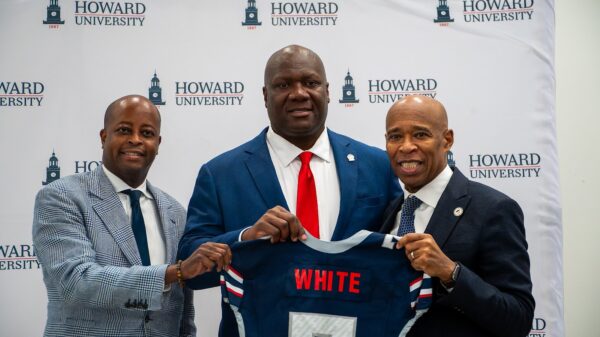
Athletics at many colleges or universities is the foundation of a school’s culture and spirit. It significantly contributes to the flow of admissions, the quality of candidates and most importantly revenue generation.
Howard University continues to lack the caliber of facilities, equipment and other athletic resources that exist at other comparable Division I schools. Despite Howard being a top HBCU in the nation with a track record of generous funding, we won’t be on the same level as other athletic programs with a more storied success on the football field or basketball court.
The determined amount of money committed to our programs will simply not be as much.
However, the professional sports world has become familiar with a growing trend in investment, and the next area of opportunity is college athletics.
Traditionally, sports franchises have been bought and owned by a small group of partners or high-net-worth families. Especially the NFL’s Jerry Jones and Robert Kraft, owners of the Dallas Cowboys and New England Patriots, respectively, or the NBA’s Mark Cuban and the late Dr. Jerry Buss, owners of the Dallas Mavericks and the Los Angeles Lakers, respectively.
These people are clear examples of prominent business moguls who soon became well-known as some of America’s most popular franchise owners.
But in the past two decades, we have begun to see more institutional investment in the realm of sports. Considered to be one of the first in the space was CVC Capital’s investment into Formula One Group in 2005. Increased valuation in this sub-sector of entertainment has garnered more attention from private equity investors eyeing the gold mine of sports.
George Hamilton III, a senior journalism major and economics minor from Carson, California, understands how this type of ownership is apparent in soccer overseas and how it could be hitting the U.S. harder soon.
The private equity rules for the MLS differ slightly from the other soccer and North American sports leagues. There are a host of criteria that make a firm “qualified” and a set of rules have been applied like capping the amount of teams a fund can invest in and how much stake they can acquire.
However, reputable firms have decided to capitalize on these opportunities. For example, Ares Management’s $150 million investment in Inter Miami and Arctos Sports’s ownership stake in Real Salt Lake, both franchises in the MLS.
“The whole aspect of private investment into sports is becoming global, especially for example in soccer,” Hamilton said. “Football and basketball are the two sports that will benefit from it here in the U.S. but I do think soccer will continue to grow in this country.”
According to research company Pitchbook, more than a third of clubs in Europe’s “Big Five” leagues are backed by some form of U.S.-based private capital in addition to the massive amounts of money sourced from Middle Eastern entities.
Chelsea FC, a London-based English Premier League Football club transferred ownership to a U.S.-led consortium led by Todd Boehly of Eldridge Industries and Clearlake Capital Group in May of last year. Also included in the consortium is Mark Walter, co-founder and CEO of Guggenheim Capital, who along with Boehly shares ownership of the Los Angeles Lakers, Los Angeles Dodgers, and Los Angeles Sparks.
Hamilton continued to say, “I do think that in five or maybe even three years we will see more private equity investment in the NBA or NFL.”
One of the main contributors to the accelerated growth of this industry has been media rights deals. The NBA, the fastest growing of the four U.S. sports leagues on average in the past decade including the NFL, MLB and NHL, is looking to renew a media deal after the 2024-25 season that could be worth $75 billion for a nine-year contract.
According to Forbes, the NFL currently has media contracts valued at an aggregate of $125.5 billion with a wide variety of large media conglomerates and tech companies including Walt Disney Company, Alphabet and Amazon.
“Especially with the amount of money that’s made from media contracts and TV deals . . . and the revenue that comes from the college football playoffs and March Madness, I can definitely see more private investment into the college athletics space in the near future,” Hamilton said.
Another opportunity that presents itself for these firms is the need for capital from certain athletic programs and the potential impact that it could have on the university. Major state and private schools face financial dilemmas that could cost them many of their varsity sports.
Florida State, who recently reported that they were running behind in revenue relative to their power conference competitors, had engaged in discussions with Sixth Street Partners for a potential investment in the athletic department, per Front Office Sports. The University of Arizona also announced that it may have to cut athletic programs due to budget and cashflow miscalculations.
According to a 2018 National Bureau of Economic Research report, the average revenue for the athletic departments from a sample of 46 public institutions in the Power Five conferences was $125 million in 2018, a 60 percent increase from a decade ago. Proceeds from their profitable football and basketball programs were able to offset a 71 percent increase in the losses incurred by non-revenue generating sports.
If school athletic departments in need receive additional funding, money can be spent well and spread throughout different sports and various resources that benefit the school and the students attending.
“It can allow the athletic department to grow in terms of new equipment, facilities, weight rooms, and infrastructure for spectating,” Madison Alston, a junior marketing major and sports management minor from Elkridge, Maryland, said. Winning programs cultivate passion and pride within the student body as well.
To indicate what further investment in Howard athletics could do for the university, she gave a comparison to how the hype of the University of Colorado Boulder Football program affected that school. Alston said “They were interviewing students and seeing that there was much more school spirit… Everyone was excited and proud to be representing their school.”
In recent years, Howard has received funding for their athletic programs and facilities. In 2022, Nuna Baby Essentials Inc. pledged $1 million to remodel the gym, adding offices and locker rooms to that list of upgrades in the near future. To jumpstart Howard’s golf program, NBA superstar Stephen Curry donated $6 million over 6 years to get the team competing again for the first time in 50 years.
Copy edited by Alana Matthew





